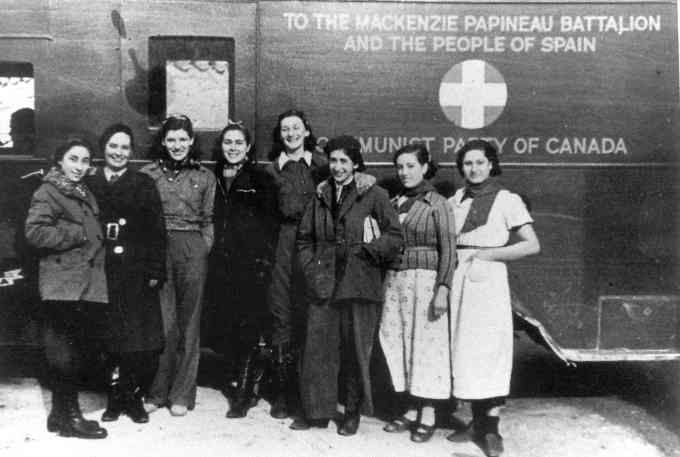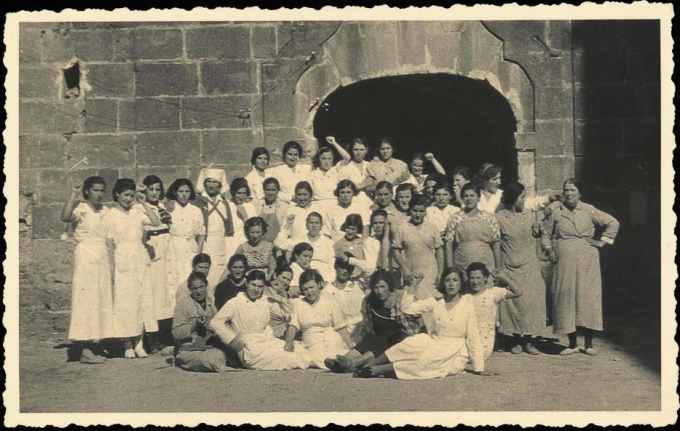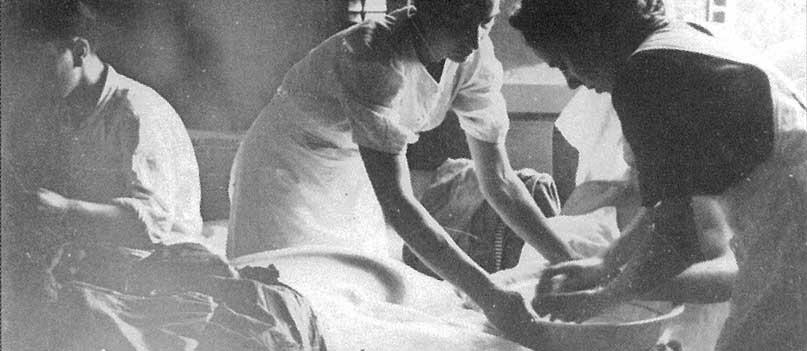The role of the Latvian women who participated in the Spanish Civil War is a very important topic for this blog. It provides us a more complete social picture of this phenomenon. Despite most of the Baltic volunteers were men, there were also some tens of women by their side. Nowadays it is possible to put faces to their names. Their stories deserve their own lines.
The Spanish Civil War meant to be the first battlefield of all time in which women fought as volunteers and taking an active part in a foreign conflict, risking their lives for a major cause which they considered worthy.
The Great War and the Russian Revolution changed the role of women in society for good. Since the incorporation of the womankind into the wage labor system, the political dimensions for and by the female gender got expanded. Its most evident conquest: the right to vote. The universal suffrage was imposed during the 20’s in several countries of the world.
In Spain, universal suffrage was adopted in 1933. During the decade of the 30’s, in Spain, left-wing political parties and trade unions worked for equality. But during the Spanish Civil war it began a new political stage for women, materializing the breaking of former and traditional gender limits and even joining militia units.
Still, this female military participation lasted only during the first months of war, until Largo Caballero’s government withdrew female troops from the front lines in 1937 and they were incorporated to administrative, productive and interpretative tasks.
Most of the Latvian women who volunteered for Spain joined the International Sanitary Service (SSI), but there were also clandestine organizers and propagandists. They were mostly Jewish (or came from Jewish roots) who had fled Latvia in the very early 30’s and had carried out their medical studies at Central European universities, such as in Prague, Paris and Berlin. Most of them were members of different national brunches of the Communist Party and other left-wing European organizations as the International Red Aid.
By 1937, meanwhile the Spanish conflict got bloody (due to the Nazi-Fascist support towards Franco, the beginning major offensives and military experimentation, the Rebel bombings of Madrid and other Republican cities), it was established a hospitals network to provide medical care to the subsequent waves of wounded and refugees. Precisely it was this dramatic atmosphere, exploited in a good move by the Republican propaganda through international press and photographies, which supplied the motivation for hundreds of volunteers to help the Loyalist population as nurses, doctors or mere volunteers.
Not all the nurses and doctors were women, but most of the Latvian women served in Spain as doctors and nurses. It is not possible (yet) for the researcher, to state an accurate quantification of the total number of Latvian women who volunteered for Spain. This is mainly due to the lack of relevant primary evidence, in view of the volunteers for the International Sanitary Service (SSI) were not administrated by the IB headquarters and, therefore, the located documentation is still being scarce. Nevertheless, according to the documentation at my disposal, nowadays it is possible to put faces to their names. Their stories deserve their own lines.

Group of Canadian nurses in Spain (1937) / Archives of the University of Salford Manchester
So far, the following 3 latvietes (Latvian women) have been identified as nurses within the frame of the International Sanitary Service:
- Dora Donda
- Frida Marta Ginsburg
- Civja Vospe.
But there was quite a large number of female doctors from Latvia. So far, I have been capable to supply documentation for 5 cases. Their names are:
- Braina Rudina
- Miriam Rudina
- Ela Aronovna
- Sara Svalbe
- Sara Gavrilovna
We will dedicate them individual biographies in further articles of BRĪVPRĀTĪGIE.

Nursing Staff at Huete hospital / (http://internationalbrigadesinspain.weebly.com/)
Despite being a small group number in numerical terms, the Latvian women composed, actually, the widest group of female doctors (in percentage terms) out of all the nationalities within the frame of the SSI. Some of them obtained in Spain high ranks within the SSI system, promoted even to heads of diverse IB hospitals. But that is something we will observe in their individual biographies.
This is the outline of the Latvian doctors and nurses. But there are also some recorded cases of Latvian women who cooperated as clandestine agents in the organization and recruitment of volunteers for Spain since the early outbreak of the conflict. So is the case of Masja Zilbermane, member of the Latvian Socialist Party (LSP) who was a key organizer in Paris for the transportation of the European volunteers. We will address her story separately.
The incorporation of women from all over the world to the International Brigades vouches for the belief on the construction of an equal world and breaks the gender stereotypes which come to say that the women of the IB had a secondary and complementary role. They were not some kind of ”curator angels” or mere companions for their partners, they came to Spain on their own to fight for the Republican cause: they were political activists who took an active and essential role in a war that was none of theirs, but which they considered worthy.


Thank you for sharing information about Latvian volunteers in the International Brigades . It’s a very interesting series, and i’d like to find out more.
LikeLike
Thanks for your words, Peter. There is much more to research yet!
LikeLike
I have the list peole you are looking jean
LikeLike
Hi Jean,
Thanks for your interest. Which lists are you talking about?
LikeLike